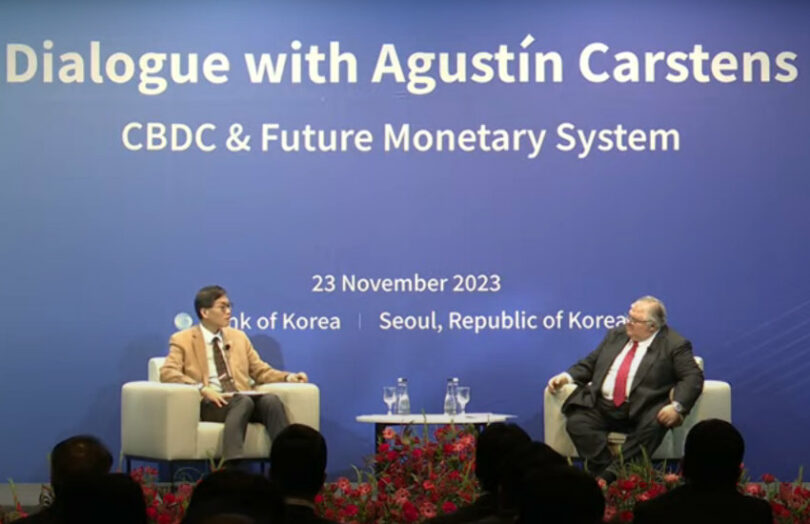Today Agustín Carstens, the head of the Bank for International Settlements (BIS), spoke at the Bank of Korea (BOK) and had a conversation with the BOK Governor, Chang Yong Rhee. Carstens gave a rousing speech on tokenization and central bank digital currency (CBDC), urging central banks and banks to make a “quantum leap”. Governor Rhee discussed the sense of urgency and the concern that Visa or Mastercard might launch a stablecoin.
The Carstens speech is well worth reading. “Exploiting these technological advances would allow us to build a financial system centred on the individual. This would enable a far-reaching democratisation of finance where each person has access to a digital representation of any asset for financial purposes, regardless of its value. And they would be able to send or receive such assets in any unit or amount, to anyone, anywhere, anytime, using any device,” he said.
The need for a quantum leap
Afterward, Governor Rhee asked him about his reference to a quantum leap. Mr. Carstens spoke about his time as Governor of the Bank of Mexico, which uses planes to distribute cash around the country. The planes were regularly upgraded, but at 40 years old they were inefficient and unreliable aircraft and needed replacing, which he did.
He’s concerned that too much of today’s financial system uses legacy technology. Mr. Carstens’ message was that patching current systems is not enough. There’s a need to move away from siloed systems integrated by messaging to one where reconciliations are no longer needed.
“What is special about us that we cannot do this? For me, that is the key issue. We need to have the confidence that we should do it,” said Carstens. “The overarching objective of having a much better financial system should be the driving force.”
During his conversation with the Governor, Mr. Carstens spoke about central bank digital currency (CBDC). He said it’s “much better to do it with time, in such a way that society is completely on board. That we have all the legal comfort behind us. And also that technologically we do it right because it cannot fail.”
The threat of Visa, Mastercard stablecoins
In response, Governor Rhee asked whether there was enough time to prepare for the transition. He pointed to the launch of PayPal’s stablecoin and the fact that “a United States regulatory body couldn’t say no.” While that stablecoin is currently limited to the United States, his real concern is the potential for a Visa or Mastercard stablecoin with their international networks.
“I think the fact that PayPal, Visa, Mastercard, these big names, a parallel system of stablecoins could be generated that compete with sovereign currencies, is a concern,” said Mr. Carstens. “And therefore I think that behoves authorities to move as fast as possible, given the constraints they face. I share your sense of urgency.”
The Unified Ledger and blockchain
The BIS has the concept of a Unified Ledger for tokenization and institutional transactions between banks and central banks. When it released its Unified Ledger paper, we noted that the document was all about tokenization. It talked about smart contracts but there was no direct mention of blockchain or DLT. Governor Rhee asked Mr. Carstens whether the Unified Ledger concept encompassed blockchains. “It can use blockchain technology,” said Mr. Carstens. “But it definitely has to be permissioned.”
At another point, Governor Rhee noted that non banks were unhappy about their lack of inclusion in the first wholesale CBDC trials in Korea. Mr Carstens responded that he didn’t see any reason why non banks couldn’t participate in the Unified Ledger.
The talk coincided with the Bank of Korea publicly unveiling its plans for its wholesale CBDC trials.






